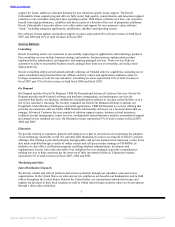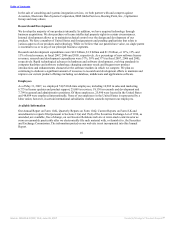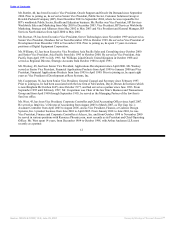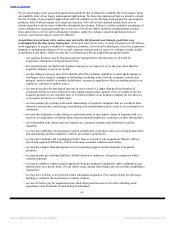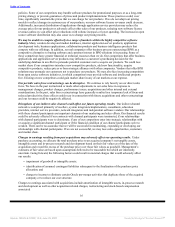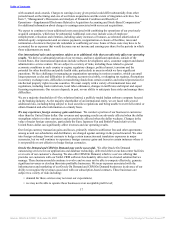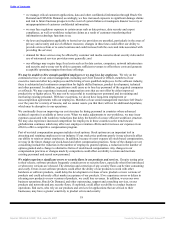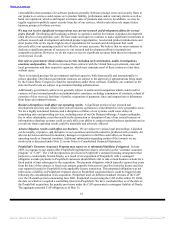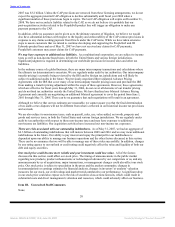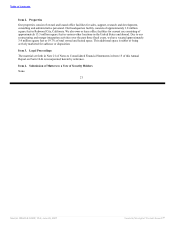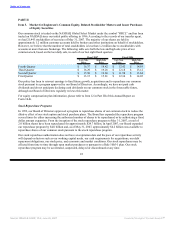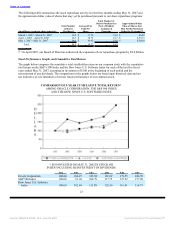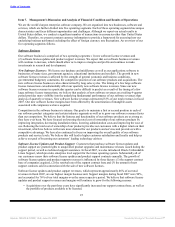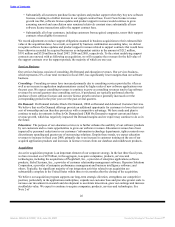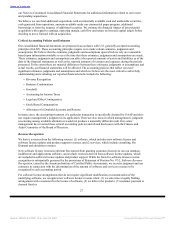Oracle 2006 Annual Report Download - page 21
Download and view the complete annual report
Please find page 21 of the 2006 Oracle annual report below. You can navigate through the pages in the report by either clicking on the pages listed below, or by using the keyword search tool below to find specific information within the annual report.
Table of Contents
with assumed stock awards. Charges to earnings in any given period could differ substantially from other
periods based on the timing and size of our future acquisitions and the extent of integration activities. See
Item 7, “Management’s Discussion and Analysis of Financial Condition and Results of
Operations—Supplemental Disclosure Related to Acquisition Accounting and Stock-Based Compensation”
for additional information about charges to earnings associated with our recent acquisitions.
We expect to continue to incur additional costs associated with combining the operations of our previously
acquired companies, which may be substantial. Additional costs may include costs of employee
redeployment, relocation and retention, including salary increases or bonuses, accelerated amortization of
deferred equity compensation and severance payments, reorganization or closure of facilities, taxes and
termination of contracts that provide redundant or conflicting services. Some of these costs may have to be
accounted for as expenses that would decrease our net income and earnings per share for the periods in which
those adjustments are made.
Our international sales and operations subject us to additional risks that can adversely affect our operating
results. We derive a substantial portion of our revenues, and have significant operations, outside of the
United States. Our international operations include software development, sales, customer support and shared
administrative service centers. We are subject to a variety of risks, including those related to general
economic conditions in each country or region, regulatory changes, political unrest, terrorism and the
potential for other hostilities and public health risks, particularly in areas in which we have significant
operations. We face challenges in managing an organization operating in various countries, which can entail
longer payment cycles and difficulties in collecting accounts receivable, overlapping tax regimes, fluctuations
in currency exchange rates, difficulties in transferring funds from certain countries and reduced protection for
intellectual property rights in some countries. We must comply with a variety of international laws and
regulations, including trade restrictions, local labor ordinances, changes in tariff rates and import and export
licensing requirements. Our success depends, in part, on our ability to anticipate these risks and manage these
difficulties.
We are a majority shareholder of i-flex solutions limited, a publicly traded Indian software company focused
on the banking industry. As the majority shareholder of an international entity, we are faced with several
additional risks, including being subject to local securities regulations and being unable to exert full control or
obtain financial and other information on a timely basis.
We may experience foreign currency gains and losses. We conduct a portion of our business in currencies
other than the United States dollar. Our revenues and operating results are adversely affected when the dollar
strengthens relative to other currencies and are positively affected when the dollar weakens. Changes in the
value of major foreign currencies, particularly the Euro, Japanese Yen and British Pound relative to the
United States dollar can significantly affect revenues and our operating results.
Our foreign currency transaction gains and losses, primarily related to sublicense fees and other agreements
among us and our subsidiaries and distributors, are charged against earnings in the period incurred. We enter
into foreign exchange forward contracts to hedge certain transaction and translation exposures in major
currencies, but we will continue to experience foreign currency gains and losses in certain instances where it
is not possible or cost effective to hedge foreign currencies.
Oracle On Demand and CRM On Demand may not be successful. We offer Oracle On Demand
outsourcing services for our applications and database technology, delivered either at our data center facilities
or at a site of our customer’s choosing. We also offer CRM On Demand, which is a service offering that
provides our customers with our Siebel CRM software functionality delivered via a hosted solution that we
manage. These business models continue to evolve and we may not be able to compete effectively, generate
significant revenues or develop them into profitable businesses. We incur expenses associated with the
infrastructures and marketing of our Oracle On Demand and CRM On Demand businesses in advance of our
ability to recognize the revenues associated with our subscription-based contracts. These businesses are
subject to a variety of risks including:
• demand for these services may not meet our expectations;
• we may not be able to operate these businesses at an acceptable profit level;
17
Source: ORACLE CORP, 10-K, June 29, 2007 Powered by Morningstar® Document Research℠


